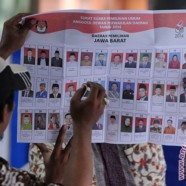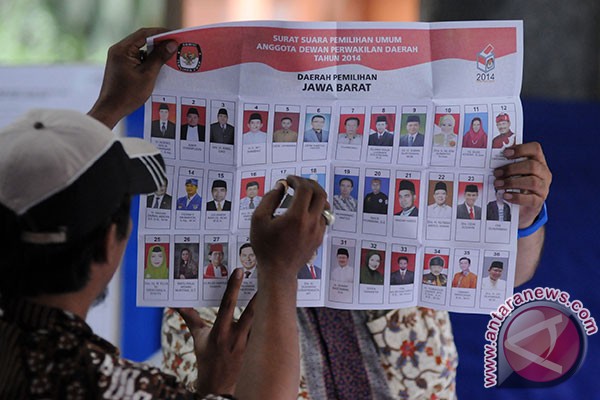Hats off to Indonesia
On the 9th, Indonesians go to the polls to elect 560 members of the House of Representatives (as well as 132 to the Regional Representatives Council, which has also to approve matters of regional interest) from among 6,680 candidates.
This is a major event in the world’s third largest democracy, the fourth most populous nation in the world. It is also a precursor to the presidential election in July as only candidates from parties with 20% of the seats and 25% of the popular votes cast for the legislature can then stand.
Indonesians can justly be proud of their democracy, an order which has thrived since the fall of Suharto in 1998. Over 187 million are eligible to vote, of whom 67 million will be voting for the first time, in a country bursting with dynamic population growth, even if that also has its problems.
It is often not recognised how far Indonesia has developed politically. It is a huge country moving ahead which is only seen for the huge problems it faces. Actually the progress of its democracy has been remarkable. Of course, it gets messy but the political underpinning is clear and positive.
Fundamentally, Indonesia is a tolerant political entity. The tone from the top is clear. Moderation, recognition of diversity and disavowal of unnecessary intrusion into private choices. Corruption is a massive challenge, but the KPK (Corruption Eradication Commission) is distinguished by going after the big fish too.
Other South-East Asian countries, including Malaysia, can learn from Indonesia’s political development – and be proud of it. It is the largest country and economy in the region which will set the pace of its evolution, particularly of Asean integration.
Understanding the country, engagement with it and recognition of its place would help in forging genuinely close connections. These coming elections could be a watershed for the country and the region.
While the legislative elections come first, all eyes are on the presidential election afterwards. Joko Widodo (well-known as Jokowi) has been nominated as his party’s presidential candidate after many months of uncertainty over whether his party leader Megawati Sukarnoputri would choose him, or stand herself.
Any further delay of the belated announcement would have allowed Gerindra’s Prabowo Subianto, who had already been conducting a slick campaign, to make further inroads into Jokowi’s lead in the polls, and would not have helped the electoral chances of his party PDI-P, the Democratic Party of Struggle.
A poll in February showed Jokowi’s popularity had fallen from 36% in October to 31.8% while that of Prabowo had risen to 12.8% from 6.6%. There are other candidates of course, notably Aburizal Bakrie of the well-oiled Golkar party, but the contest is shaping up to be between Jokowi and Prabowo.
There is little doubt Jokowi is hugely popular. The PDI-P which had been lagging because his candidacy was for so long not announced, has gained ground. It is important for the PDI-P to do well in the election for the legislature for its candidate to stand and contest for President in July, and to dominate the legislature afterwards.
Of around 187 million eligible voters in the world’s fourth most populous country, 67 million – the young who largely support Jokowi – will be voting for the first time. As many as 30% eligible voters usually do not vote. This time many are anecdotally recorded as saying they will only not vote if Jokowi did not stand.
From his record as Governor of Jakarta, there is belief in his hands-on approach, his commitment to fight corruption, the desire to build better infrastructure and his plan to tackle widespread tax evasion.
Yet it will be a mistake to assume it will be a shoo-in for Jokowi. His opponents are formidable political operators even if their record in governance is unedifying. Prabowo, and particularly Aburizal, have enormous financial resources.
Already a “Stop Jokowi” campaign has developed. It is being put that he is too young, and that he lacks national and international experience. That his popularity in the polls is a contrived piece of fiction. That he would not suitably represent Indonesia with his simplicity and unaffected manner.
His plans to move tax collection online, while supported at popular level, certainly will find resistance from privileged tax evaders.
The point is also made, not being chairman of his party means he will need to go back to Megawati to get support should he become President.
All this could very well coalesce in a combined front to stop him from being elected President, even if his party commands the greatest number of votes and seats in the legislative election next week. It is still a long time to July and such an alliance is not inconceivable.
The PDI-P, therefore, has to win and to win big. Jokowi has to translate popular support for him into electoral support for his party. The issues being fought over are highly provincially-charged. How does he rouse a national purpose in 32 provinces, some of which like Aceh, demonstrate the most parochial tendencies?
The decentralisation which his party leader started has taken root. Can Jokowi use his appeal to bring Indonesians to common purpose?
If he can’t, nobody can. But, even if he becomes President, he would still have to work with the various parties, thankfully there will only be 12 contesting this time, for support. The political horse-trading that goes on can frustrate. However, if he obtains a huge presidential mandate, and his party is dominant in the legislature, his position will be strong.
And, if he can get establishment support – Jusuf Kalla (the current President’s disenchanted first term Vice-President) has been mentioned as a possible running mate – Indonesia might be set for positive political and structural economic change.
A President Jokowi who fulfills his promise will romp home in 2019 when legislative and presidential elections are held together for the first time in line with the recent constitutional court ruling.
The region, particularly Asean, of course has an interest in the outcome and policies afterwards. While regional or foreign policy has hardly figured in the campaign so far, it is also hardly likely that Indonesia will close shop and look inwards afterwards. It is a global world, and there are regional matters, political and economic, which involve Indonesia; some of which need Indonesian leadership.
If Jokowi becomes President, his people-based policies could in turn become, for Asean, an important platform in its next phase of its people-centred development.
source: thestar.com.my
author: Tan Sri Dr Munir Majid, chairman of Bank Muamalat and visiting senior fellow at LSE Ideas (Centre for International Affairs, Diplomacy and Strategy), is also chairman of CIMB Asean Research Institute.


